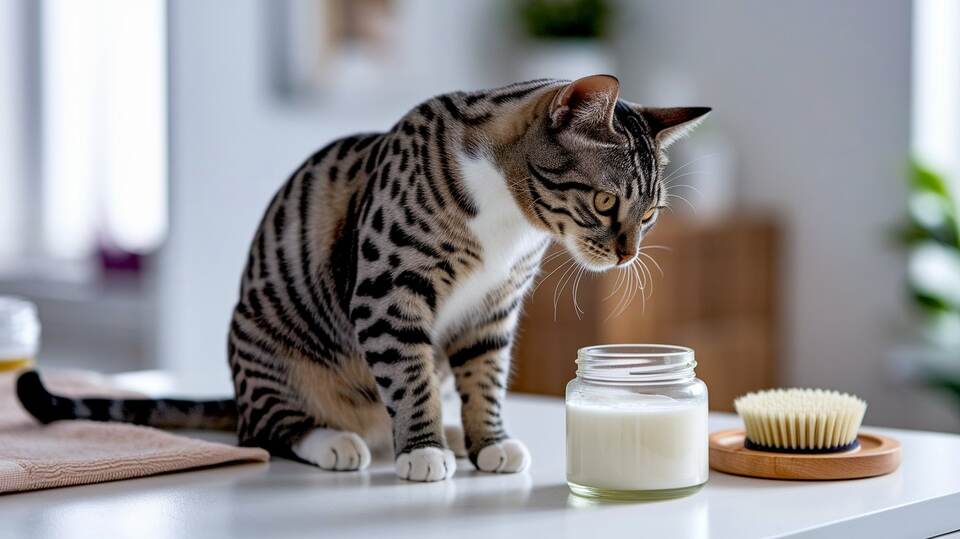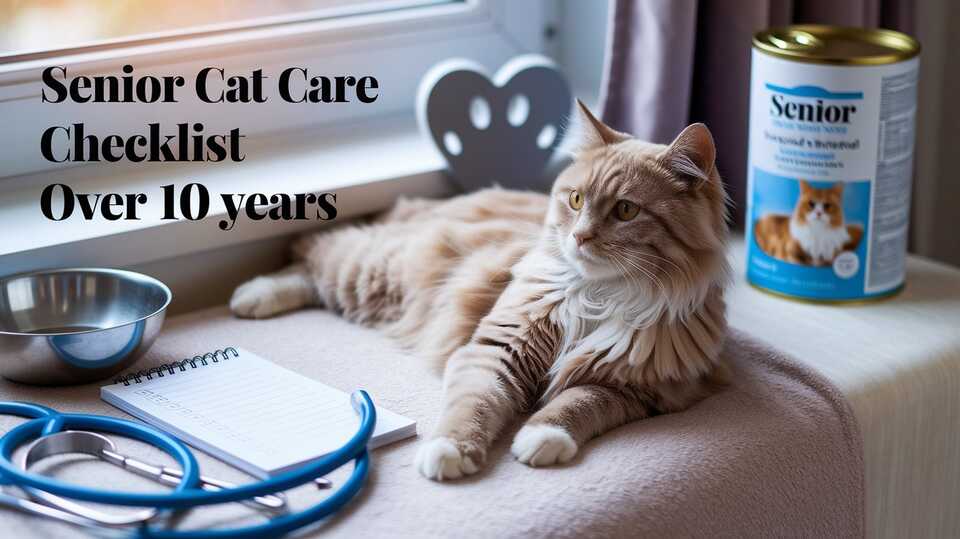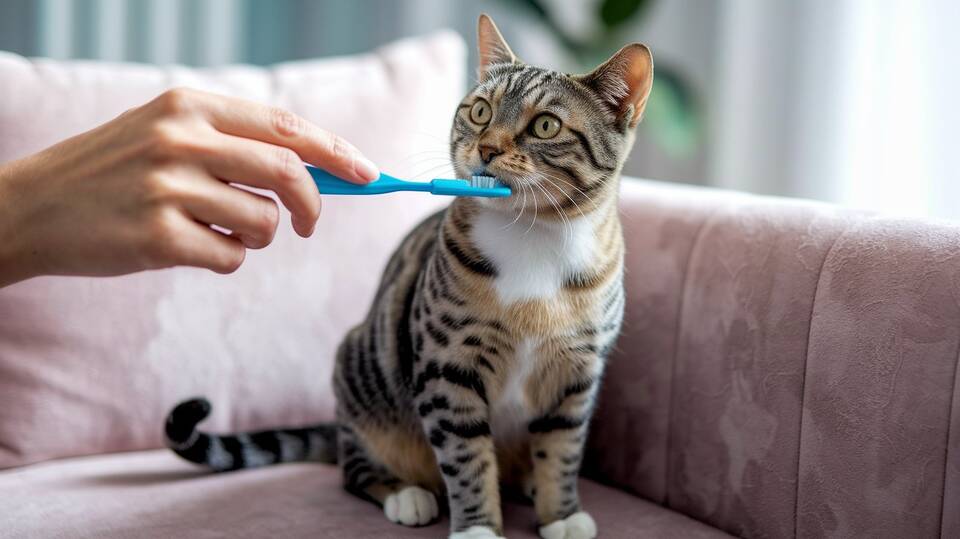
Medical Disclaimer: This article is for educational purposes only and is not intended to replace professional veterinary advice. Always consult with your veterinarian before introducing any new supplements to your cat’s diet.
Introduction
I still remember the day I found myself staring at a jar of organic coconut oil in my kitchen, wondering if this miracle ingredient that had transformed my own skin and hair routine could help my cat, Whiskers, with his persistently dry, flaky skin. Like many cat parents, I’d been caught up in the coconut oil health craze and was curious whether this natural remedy could benefit my feline friend. But as I researched deeper, I discovered that the question “can cats eat coconut oil” doesn’t have a simple yes or no answer.
The coconut oil trend has exploded in recent years, with global sales reaching over $4.6 billion as people discover its potential benefits for everything from cooking to skincare. Naturally, this enthusiasm has spilled over into the pet world, with many cat parents wondering if they should add this tropical oil to their feline’s health regimen. Social media is filled with before-and-after photos of cats with shinier coats and claims about improved digestion, but separating fact from marketing hype requires careful examination of the evidence.
Here’s what makes this topic particularly complex: while coconut oil for cats isn’t toxic in the way that chocolate or onions are, it’s not necessarily beneficial either. The reality is that cats have unique metabolic needs that differ significantly from humans and even dogs. What works as a superfood for us might be unnecessary or even problematic for our feline companions.
The challenge for responsible cat parents is navigating conflicting information online. Some sources enthusiastically promote coconut oil as a cure-all for feline health issues, while others warn against any fat supplementation for cats. The truth, as veterinary nutritionists explain, lies somewhere in the middle and depends heavily on your individual cat’s health status, age, and specific needs.
In this comprehensive guide, we’ll explore the scientific evidence behind cats and coconut oil benefits, examine the real risks involved, and provide practical guidelines for safe usage if you choose to incorporate coconut oil into your cat’s routine. Most importantly, we’ll help you make an informed decision based on current veterinary knowledge rather than internet trends or marketing claims.
Understanding Coconut Oil’s Composition and Appeal
Before diving into whether can cats eat coconut oil safely, it’s essential to understand what coconut oil actually is and why it has gained such popularity in both human and pet health circles.
Types of coconut oil available on the market vary significantly in their processing and purity. Virgin coconut oil is extracted from fresh coconut meat without chemical processing, retaining more of the natural compounds that proponents claim provide health benefits. Refined coconut oil undergoes processing that removes some of these compounds but creates a more neutral taste and longer shelf life. Fractionated coconut oil has been further processed to remain liquid at room temperature, making it popular for topical applications.
Medium-chain triglycerides (MCTs) represent the primary component that gives coconut oil its supposed health benefits. Unlike long-chain fatty acids found in most dietary fats, MCTs are absorbed more quickly and processed differently by the liver. In humans, this can lead to faster energy production and potentially improved metabolism. However, cats metabolize fats differently than humans, which is crucial to understanding coconut oil’s effects on feline health.
The appeal for pet owners often stems from coconut oil’s antimicrobial properties, primarily due to its lauric acid content. Lauric acid converts to monolaurin in the body, which has been shown to have antibacterial and antifungal properties in laboratory studies. This has led to claims about coconut oil helping with everything from digestive issues to skin problems in pets.
Scientific research status on coconut oil specifically for cats remains limited. Most studies focus on human applications, with some research on dogs, but very little peer-reviewed research exists on feline-specific benefits or risks. This research gap means that many claims about coconut oil for cats are extrapolated from human or canine studies, which may not apply to cats’ unique physiology.
Topical versus internal use represents an important distinction often overlooked in discussions about coconut oil for pets. The risks and benefits of applying coconut oil to a cat’s skin differ significantly from having them ingest it. Cats’ grooming habits also mean that topical applications often become internal consumption, complicating the safety equation.
The growing interest in natural pet supplements has created a market where coconut oil is often promoted as a safe, natural alternative to commercial pet products. However, “natural” doesn’t automatically mean safe or beneficial for cats, whose dietary needs evolved for a strictly carnivorous lifestyle.
Veterinary Consensus on Coconut Oil Safety
The professional veterinary community’s position on coconut oil for cats is more nuanced than the enthusiastic endorsements or dire warnings you might find on social media.
Official veterinary organizations like the American Veterinary Medical Association don’t specifically prohibit coconut oil use in cats, but they also don’t recommend it as a necessary supplement. The consensus among veterinary nutritionists is that coconut oil falls into the “probably not harmful in small amounts” category rather than the “beneficial and recommended” category.
ASPCA and poison control guidance classifies coconut oil as generally non-toxic to cats, meaning it won’t cause immediate poisoning if consumed in reasonable amounts. However, this classification doesn’t address the potential for digestive upset, weight gain, or other health issues that can arise from regular supplementation.
Moderation as the key principle emerges as the consistent theme in professional discussions about coconut oil for cats. Veterinarians who do approve limited coconut oil use typically emphasize tiny amounts, infrequent usage, and careful monitoring for adverse effects. This conservative approach reflects the limited research available and cats’ susceptibility to dietary fat-related health issues.
The distinction between safe and beneficial is crucial for cat parents to understand. Something can be safe in small quantities without being beneficial or necessary for your cat’s health. Coconut oil may not harm most cats in minimal amounts, but that doesn’t mean it provides meaningful health benefits that justify the potential risks.
Situations requiring complete avoidance include cats with history of pancreatitis, digestive sensitivities, obesity, or other metabolic disorders. For these cats, even small amounts of added dietary fat can trigger serious health problems that far outweigh any potential benefits.
The veterinary perspective consistently emphasizes that cats’ nutritional needs are best met through high-quality, complete commercial cat foods or properly balanced homemade diets formulated by veterinary nutritionists. Supplements like coconut oil should never replace proper nutrition or veterinary care for health issues.
Evidence-Based Health Benefits
When examining the claimed benefits of coconut oil for cats, it’s important to separate marketing hype from scientific evidence and understand what research actually supports.
Topical Applications for Healthy Fur
Skin and coat health represents the area where coconut oil shows the most promise for feline applications, primarily through topical use rather than dietary supplementation. The moisturizing properties of coconut oil can help with minor dry skin issues, particularly in cats living in dry climates or heated homes during winter months.
Anti-fungal benefits from coconut oil’s lauric acid content may provide mild relief for minor skin irritations, though this shouldn’t replace veterinary treatment for diagnosed fungal infections. Some cat parents report improved coat shine and texture with occasional topical coconut oil application, though individual results vary significantly.
Safe application methods for topical use involve warming a tiny amount of coconut oil between your hands and gently massaging it into specific dry areas of your cat’s skin, avoiding areas they can easily lick. The key is using minimal amounts that absorb quickly rather than leaving greasy residue that cats will inevitably groom off.
Application frequency should be limited to occasional use rather than daily application. Most veterinarians recommend testing topical coconut oil on a small skin area first and limiting use to once or twice weekly at most. Remember that cats will groom off any topical applications, so even “external” use becomes internal consumption.

MCTs and Gastrointestinal Health
Digestive support claims surrounding coconut oil often focus on MCTs’ easier digestibility compared to long-chain fatty acids. However, cats’ digestive systems are evolved for processing animal fats rather than plant-based oils, which limits the relevance of human digestive research.
Limited research on feline digestive benefits means that most claims about coconut oil improving cat digestion are based on anecdotal reports rather than scientific studies. While some cat parents report improved digestion with tiny amounts of coconut oil, these improvements could result from other dietary or environmental changes occurring simultaneously.
Potential for sensitive stomach cats exists, but coconut oil could just as easily cause digestive upset as improve it. Cats with sensitive stomachs often do better with minimal dietary changes rather than added supplements, making coconut oil a risky choice for these individuals.
Realistic expectations should focus on the fact that healthy cats with proper diets typically don’t need digestive aids. If your cat has chronic digestive issues, veterinary evaluation and appropriate treatment are more beneficial than experimental supplementation with coconut oil.

Lauric Acid and Immune Function
Immune system support claims often highlight coconut oil’s antimicrobial properties, but the reality is more complex when applied to feline health. While lauric acid does have antimicrobial properties in laboratory studies, these effects don’t necessarily translate to meaningful immune support when consumed by cats.
Research limitations in feline applications mean that most immune system claims are extrapolated from human or in-vitro studies. Cats’ immune systems function differently from humans, and their dietary needs for immune support are best met through high-quality protein sources and essential nutrients found in balanced cat foods.
Supporting versus replacing veterinary care represents a crucial distinction. Even if coconut oil provided some immune benefits for cats, it should never replace proper veterinary care, vaccinations, or treatment for immune-related health issues.
The evidence for immune benefits in cats remains largely theoretical, making coconut oil an unnecessary addition to most cats’ health routines when proper nutrition and veterinary care are already in place.

Metabolism and Weight Control Claims
Weight management considerations around coconut oil often focus on MCTs’ potential metabolic benefits, but these claims are particularly problematic when applied to cats. Coconut oil is calorie-dense, containing about 120 calories per tablespoon, which can easily contribute to weight gain rather than weight loss.
MCT metabolism differences in cats haven’t been thoroughly studied, but cats’ carnivorous metabolism is optimized for processing animal-based fats rather than plant oils. The metabolic advantages of MCTs documented in human studies may not apply to feline physiology.
Caloric content concerns make coconut oil a poor choice for overweight cats or those prone to weight gain. The calories from coconut oil supplementation often aren’t accounted for in daily caloric intake, leading to gradual weight gain that can contribute to serious health problems over time.
Evidence limitations for feline weight management mean that claims about coconut oil helping cats lose weight are unsupported by scientific research. Weight management in cats is best achieved through controlled feeding of appropriate commercial diets and increased exercise, not through supplementation with high-calorie oils.

What Every Cat Owner Should Know About Coconut Oil Risks
While can cats eat coconut oil might have a cautiously positive answer in terms of toxicity, the risks associated with coconut oil supplementation are significant and often underestimated by well-meaning cat parents.
Digestive Upset and Diarrhea Risks
Gastrointestinal issues represent the most common and immediate risk of coconut oil consumption in cats. The high fat content can overwhelm cats’ digestive systems, particularly those not accustomed to rich foods, leading to diarrhea, vomiting, and stomach upset.
High fat sensitivity in cats varies significantly between individuals, but many cats have difficulty processing the concentrated fats found in coconut oil. Even small amounts can trigger digestive upset in sensitive cats, and these reactions can range from mild stomach discomfort to severe diarrhea requiring veterinary attention.
Pancreatitis risk in susceptible cats represents a serious concern that many cat parents don’t consider. Pancreatitis—inflammation of the pancreas—can be triggered by high-fat foods and can be life-threatening. Cats with previous episodes of pancreatitis, digestive sensitivities, or certain breed predispositions face higher risks from coconut oil supplementation.
Individual sensitivity variations mean that some cats may tolerate small amounts of coconut oil without problems while others experience immediate digestive upset. There’s no reliable way to predict which cats will react poorly without actually testing coconut oil, which puts cats at unnecessary risk for an optional supplement.
Symptoms to watch for include diarrhea, vomiting, loss of appetite, lethargy, and abdominal discomfort. These symptoms can appear within hours of coconut oil consumption and may persist for several days, requiring veterinary intervention in severe cases.
Hidden Calories and Obesity Risks
Caloric density concerns make coconut oil a significant contributor to weight gain when used regularly. Most cat parents don’t account for the calories added through coconut oil supplementation, leading to gradual weight gain that can contribute to diabetes, arthritis, and other obesity-related health problems.
Daily caloric calculations reveal how quickly coconut oil calories can add up. A single teaspoon of coconut oil contains about 40 calories—a significant portion of a typical cat’s daily caloric needs. For a 10-pound cat requiring 200-250 calories per day, a teaspoon of coconut oil represents 15-20% of their total daily calories.
Weight gain progression often occurs gradually with coconut oil supplementation, making it difficult to connect the weight gain to the supplement. Cat parents may not notice the gradual increase in their cat’s weight until it becomes a significant health concern requiring dietary intervention and potential veterinary treatment.
Impact on existing diet balance occurs when coconut oil calories replace calories from nutritionally complete cat food. This displacement can lead to nutrient deficiencies over time, as cats receive fewer essential nutrients while consuming empty calories from coconut oil.
Recognizing Adverse Reactions
Allergic reactions to coconut oil, while rare, can occur in sensitive cats. Signs include skin irritation, excessive scratching, digestive upset, or respiratory symptoms. Any adverse reaction should prompt immediate discontinuation of coconut oil and veterinary consultation if symptoms persist.
Skin reactions from topical coconut oil application can include redness, irritation, or increased scratching. These reactions may be delayed, appearing hours or days after application, making it important to monitor cats carefully after any topical coconut oil use.
Emergency situations requiring immediate veterinary care include severe vomiting, persistent diarrhea leading to dehydration, signs of pancreatitis (abdominal pain, lethargy, loss of appetite), or any breathing difficulties following coconut oil exposure.
Documentation importance involves keeping records of coconut oil use, amounts given, and any observed reactions. This information is valuable for veterinary consultations and helps identify patterns or triggers if health issues develop.
How to Give Coconut Oil to Cats Safely
If you decide to proceed with coconut oil for cats after consulting with your veterinarian, following proper dosage guidelines and administration methods is crucial for minimizing risks.
Veterinarian consultation should always precede any coconut oil supplementation. Your veterinarian can assess your cat’s individual health status, current diet, and risk factors to determine whether coconut oil is appropriate and safe for your specific cat.
Starting amounts should be incredibly small—no more than 1/4 teaspoon for an average-sized cat, and even less for smaller cats or those with sensitive stomachs. Many veterinarians recommend starting with just a few drops mixed into food to assess tolerance before considering larger amounts.
Gradual introduction protocols involve introducing coconut oil slowly over several weeks, monitoring carefully for any adverse reactions. If your cat tolerates the initial tiny amount without digestive upset, you might gradually increase to the maximum recommended amount, but never exceed veterinary recommendations.
Quality considerations matter significantly when selecting coconut oil for cats. Choose organic, virgin coconut oil without additives, flavors, or preservatives. Avoid coconut oils marketed specifically for cooking or cosmetic use, which may contain ingredients harmful to cats.
Frequency guidelines typically recommend no more than 2-3 times per week for cats who tolerate coconut oil well. Daily supplementation increases the risks of weight gain and digestive issues while providing no proven additional benefits.
Administration methods can include mixing tiny amounts into food, offering small amounts directly (if your cat will accept it), or using minimal amounts topically on specific dry skin areas. Never force coconut oil consumption, and discontinue use if your cat shows any reluctance or adverse reactions.
Monitoring requirements include watching for changes in appetite, digestion, energy levels, and weight. Keep a log of coconut oil administration and any observed effects to share with your veterinarian during regular check-ups.
Medical Conditions and Contraindications
Certain health conditions make coconut oil supplementation inappropriate or dangerous for cats, regardless of the potential benefits.
Cats with pancreatitis should never receive coconut oil, as the high fat content can trigger painful and potentially life-threatening pancreatitis episodes. This includes cats with previous pancreatitis episodes and breeds predisposed to pancreatic issues.
Overweight or obese cats are poor candidates for coconut oil supplementation due to the additional calories and the importance of strict caloric control for weight management. The calories from coconut oil can significantly interfere with weight loss efforts and contribute to continued weight gain.
Cats on special diets for medical conditions like kidney disease, diabetes, or food allergies shouldn’t receive coconut oil without explicit veterinary approval. These special diets are carefully formulated, and adding coconut oil can interfere with their therapeutic effects.
Senior cats may have decreased ability to process dietary fats and increased risk of pancreatitis, making coconut oil supplementation riskier. Additionally, senior cats often have multiple health conditions that could be complicated by coconut oil use.
Kittens under six months have developing digestive systems that may not handle rich supplements well. Their nutritional needs are best met through appropriate kitten food rather than experimental supplementation.
Cats on medications may experience interactions or complications from coconut oil supplementation. Always consult with your veterinarian about potential interactions between coconut oil and any medications your cat is taking.
What Veterinarians Really Think
The professional veterinary perspective on coconut oil for cats tends to be more conservative and evidence-based than the enthusiasm often seen in pet owner communities.
Clinical experience among veterinarians reveals mixed results with coconut oil supplementation in cats. While some veterinarians report occasional positive outcomes with topical use for minor skin issues, most see more problems than benefits from coconut oil supplementation, particularly with internal use.
Common concerns expressed by veterinarians include the risk of digestive upset, weight gain, pancreatitis, and the tendency for pet owners to view coconut oil as a cure-all rather than addressing underlying health issues through proper veterinary care.
Evidence-based practice principles lead most veterinarians to recommend proven treatments and high-quality nutrition over experimental supplements like coconut oil. The limited research on coconut oil for cats makes it difficult to recommend as a beneficial intervention.
Integration with conventional care is possible when coconut oil is used appropriately under veterinary guidance, but it should never replace proper medical treatment, diagnostic procedures, or nutritional management of health conditions.
Professional recommendations typically emphasize that cats’ nutritional needs are best met through complete, balanced commercial diets rather than supplementation with coconut oil or other trendy additions.
Most veterinarians prefer to focus on proven interventions for common cat health issues rather than experimental supplements with limited safety and efficacy data in feline populations.
Monitoring Your Cat’s Response
If you proceed with coconut oil supplementation under veterinary guidance, careful monitoring is essential for detecting both positive effects and concerning reactions.
Positive response indicators might include improved coat shine, reduced dry skin, or better digestion, though these improvements could result from other factors. True benefits from coconut oil are often subtle and may take weeks to become apparent.
Warning signals requiring immediate veterinary consultation include persistent digestive upset, changes in appetite or energy levels, weight gain, or any signs of abdominal discomfort that could indicate pancreatitis.
Long-term health monitoring should include regular weight checks, assessment of coat and skin condition, and discussion of coconut oil use during routine veterinary visits. Your veterinarian can help determine whether any observed changes are related to coconut oil supplementation.
Record-keeping helps track the relationship between coconut oil use and any health changes in your cat. Document amounts given, frequency of use, and any observed effects to share with your veterinarian.
Adjustment strategies may involve reducing amounts, changing frequency, or discontinuing use based on your cat’s response and your veterinarian’s recommendations. Flexibility and responsiveness to your cat’s individual needs are crucial for safe supplementation.
Conclusion
The question “can cats eat coconut oil” has a complex answer that depends heavily on your individual cat’s health status, your veterinarian’s guidance, and your realistic expectations about potential benefits versus risks. While coconut oil isn’t toxic to cats in small amounts, it’s not a necessary or universally beneficial supplement for feline health.
The enthusiasm surrounding coconut oil as a natural health remedy for cats often outpaces the scientific evidence supporting its use. Most cats receive complete, balanced nutrition from high-quality commercial diets and don’t require supplementation with coconut oil to maintain good health. The risks of digestive upset, weight gain, and potential pancreatitis may outweigh any theoretical benefits for many cats.
If you’re considering coconut oil for your cat, the most responsible approach involves consulting with your veterinarian first, starting with minimal amounts under professional guidance, and maintaining realistic expectations about outcomes. Focus on proven methods of maintaining your cat’s health—proper nutrition, regular veterinary care, and appropriate medical treatment for health issues—rather than experimental supplementation.
Remember that your cat’s individual health needs, current diet, and medical history all factor into whether coconut oil might be appropriate. What works for one cat may be harmful for another, making professional veterinary guidance essential for safe decision-making.
Ultimately, the best approach to feline health involves evidence-based veterinary care, high-quality nutrition, and careful consideration of your cat’s individual needs rather than following internet trends or anecdotal success stories. Your veterinarian remains your most reliable resource for determining whether coconut oil—or any supplement—is appropriate for your specific feline companion.
Also Read - How Much Wet Food Should I Feed My Cat Per Day? A Complete Guide for Cat Parents
FAQs About Can Cats Eat Coconut Oil
How much coconut oil can I give my cat daily?
Most veterinarians recommend no more than 1/4 teaspoon for average-sized cats, and only 2-3 times per week, not daily. Some cats may only tolerate a few drops. Always start with tiny amounts and consult your veterinarian for personalized dosage recommendations based on your cat’s weight, health status, and individual tolerance.
Can kittens have coconut oil?
Kittens under 6 months should not receive coconut oil, as their developing digestive systems may not handle rich supplements well. Kittens’ nutritional needs are best met through appropriate kitten food and mother’s milk. Even older kittens should only receive coconut oil under veterinary supervision and in extremely small amounts.
What happens if my cat eats too much coconut oil?
Excessive coconut oil consumption can cause diarrhea, vomiting, stomach upset, and potentially pancreatitis. If your cat accidentally consumes a large amount, monitor them closely for digestive symptoms and contact your veterinarian immediately if severe vomiting, persistent diarrhea, or signs of abdominal pain develop.
Is coconut oil better than fish oil for cats?
Fish oil typically provides more proven benefits for cats, particularly omega-3 fatty acids that support skin, coat, and joint health. Fish oil is more aligned with cats’ natural carnivorous diet, while coconut oil is a plant-based fat that cats haven’t evolved to process efficiently. Most veterinarians prefer fish oil over coconut oil for feline supplementation.
Can I use coconut oil on my cat’s skin?
Topical coconut oil use may help with minor dry skin issues, but use minimal amounts that absorb quickly. Remember that cats will groom off anything applied to their skin, so topical use becomes internal consumption. Test on a small area first and discontinue if any irritation develops.
Will coconut oil help my cat lose weight?
No, coconut oil is unlikely to help cats lose weight and may actually contribute to weight gain. At 120 calories per tablespoon, coconut oil adds significant calories to your cat’s diet. Weight management in cats requires controlled feeding of appropriate diets and increased activity, not high-calorie supplements.
Can diabetic cats have coconut oil?
Diabetic cats should not receive coconut oil without explicit veterinary approval. The additional calories can interfere with blood sugar management, and diabetic cats often require carefully controlled diets. Any dietary changes for diabetic cats should be made only under veterinary supervision.
How do I know if coconut oil is working for my cat?
Benefits from coconut oil, if any, are typically subtle and may include improved coat shine or reduced dry skin. However, these improvements could result from other factors. More importantly, watch for negative effects like digestive upset, weight gain, or changes in appetite, which indicate coconut oil should be discontinued.
Can I cook with coconut oil if I have cats?
Cooking with coconut oil in homes with cats is generally safe, as the amounts cats might accidentally consume from cooking residue are typically minimal. However, don’t intentionally share coconut oil-cooked foods with cats, and ensure cats can’t access containers of coconut oil directly.
What’s the difference between coconut oil types for cats?
Virgin, organic coconut oil without additives is preferable if you choose to use coconut oil for cats. Avoid refined coconut oils with additives, flavored varieties, or coconut oils containing other ingredients. However, the type of coconut oil doesn’t eliminate the fundamental risks and limited benefits of coconut oil supplementation for cats.





Your point of view caught my eye and was very interesting. Thanks. I have a question for you.